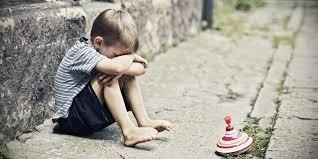The Affects of Being a Homeless Child
Homelessness is often looked and thought as adults, it could
be that we don’t want to think that children are homeless. According to Substance
Abuse and Mental Health Services Administration (SAMHSA) 51% of children who
experience homelessness are under the age of six. A staggering 2.5 million
children homeless each year in the US, one in every 30 children. SAMHSA also
addresses that while progress has been made in recent years in reducing chronic
homelessness among veterans and other single adults, Dr. Bassuk said the
opposite is true for families. Because the Department of housing and Urban
Development (HUD) does not count doubled-up families or families that are
jumping home to home on friends and family’s couches, the policymakers tend to
underestimate the number of families experiencing homelessness. Usually when a mother/father
seeks help the programs designed for families that are experiencing
homelessness tend to focus more on the needs of the adult and pay less
attention to the needs of the child.
Being homeless can be traumatizing for anyone, let alone a
child. When a young child experiences trauma it can affect their cognitive
development, mental health, and even physical health. A child being homeless
can turn into a never-ending cycle, SAMSHA states that if the families do not
find permanent housing that 40-50% of them will be separated within 5 years,
the children end up living with relatives or end up in foster care.
A homeless child can result in a lack of education as well,
luckily there is the McKinney-Vento Act: homeless education Program, this act
ensures that homeless children and youth are provided free, appropriate public
education, despite lack of fixed place of residence or supervising parent or guardian.
The unfortunate thing is by the time the child reaches the school age, the
homelessness they experienced or are experiencing can affect their social, and
academic lives. This is due to any psychological damage they may have endured.
Providing free education isn’t enough when the child cannot
participate to their full potential. It is much more than that, as a country
who is one of the wealthiest it’s hard to believe that we allow for children to
be homeless.
If you or someone you know is experiencing family
Homelessness, call 211 info toll free by dialing 2-1-1. This will direct you to
available services that include emergency and transitional housing as well as
support services to assist with permanent housing.
Portland Homeless Family
Solutions an organization that empowers homeless families with children to
get back into housing and to stay there. They also provide volunteer opportunities,
must be 18-years or older, those that are under the age of 18 must have a
parent present.
Written by: Susana Soto
For more information:
https://www.oregon.gov/ode/schools-and-districts/grants/esea/mckinney-vento/pages/default.aspx



Comments
Post a Comment